Is honey vegan? Generally speaking, no. If we assume that a honeybee is an animal, then the honey they produce is an animal product and is therefore not vegan-friendly.
However, there are shades of grey, like all ethical considerations, when debating whether honey production is humane or cruel.
According to this small poll, there’s so much confusion around honey that 20 per cent of people who identify themselves as vegan see no issue with consuming honey.
Whether you’re a vegan, non-vegan or veg-curious, we aim to answer all of the hairy questions regarding the honey industry’s ethics.
We go beyond the toxic commercial honey industry and put local beekeeping practices under the microscope as well.
Lastly, we wrap up with some actionable steps we can all take to encourage cruelty-free pollination and improve our local ecosystems.
What is honey, and how is it made?
Honey is a thick, sugary, golden liquid most commonly used as a sweetener in food, medicine and drinks.
Beeswax, another product made by bees, is used in cosmetics, waterproofing, candles, food wrapping, crayons and wood polish.
Humans have been obsessed with honey and beeswax for over 9,000 years.
To put it in perspective, a 3,000-year-old pot of honey was found in an Egyptian tomb of a deceased ancient king. Honey was a delicacy back then, and it’s speculated that this pot represented an offering to the gods. The crazy thing is, the honey was still perfectly edible 3,000 years later!
Nowadays, the honey industry is valued at over 9.21 billion dollars with an annual growth rate of 8.2% due to increasing demands and promotion of the health benefits of this golden nectar.
Honey is, of course, made by the infamous honeybee. But did you know that there are over 20,000 bee species, and the only one makes enough honey for human consumption? This is one busy segment of an incredibly diverse species!
For this article, we’ll be referring to honeybees as bees.
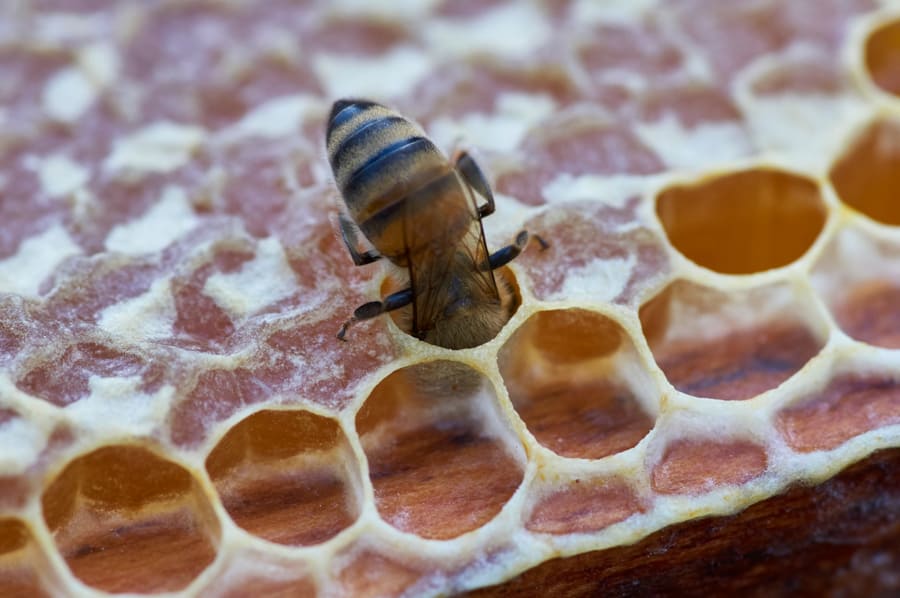
How do bees make honey?
Honey is made from bees collecting propolis, water and plant sap with their long pointed tongues.
The little creatures have a separate stomach called the crop, where they store all the nectar until they get it back to the hive. This is done once their honey stomach is full; it’s a separate stomach to their main stomach.
As they’re flying back, the enzymes begin to break down the nectar and start the process of making honey.
When the bees return, they regurgitate it into the mouth of another worker bee in the hive. They then continue the process of breaking down the water content in the nectar and the enzymes.
The reason that enzymes are essential is that they help to create the longevity of honey. This allows the bees to store as much as they need for later use without it spoiling, ever.
This process is done about 50 times over before it is transferred into the beeswax cells and is fanned with their wings to process it even further to reduce the water content even more.
The nectar goes from 70% water to 20% within the processing stage. Without the bees processing, honey would not exist. Once this is done, they seal the cell and the honey is ready.
It’s at this point that humans intervene with beekeeping or honey farming.
Read more: Is Beeswax Vegan, and What Are The Alternatives?
How is honey harvested from a beehive?
For thousands of years, honey has been extracted by using the smoking technique.
Despite the negative terminology, smoking doesn’t directly harm the bees. All it does is trick them into thinking there’s a hazardous fire nearby, triggering the bees to go into lockdown, filling their bellies with honey to preserve it for the future.
Being overly full makes the bees incredibly lethargic and passive—making it easier to manage for beekeepers when removing the bees from the hive.
At this stage, beekeepers use a variety of methods to remove the bees from the hive frames. Common approaches include:
- Shaking and brushing the bees
- Using escape boards
- High-powered bee blowers
- Fume boards
Once the bees have been successfully removed from the frame, beekeepers either use specialised extractors, gravity or manually crush and strain the combs to harvest the honey.
How much honey does a bee make in its lifetime?
Bees, by nature, collect honey and store it for the winter months for themselves as food and insulation. They fill the wax then seal it to save for later.
If you can comprehend that a bee only makes a quarter of a teaspoon of honey in its lifetime, then you’ll understand how precious this sticky nectar is for them. Bees have to visit 2000 flowers just to make a teaspoon of honey!
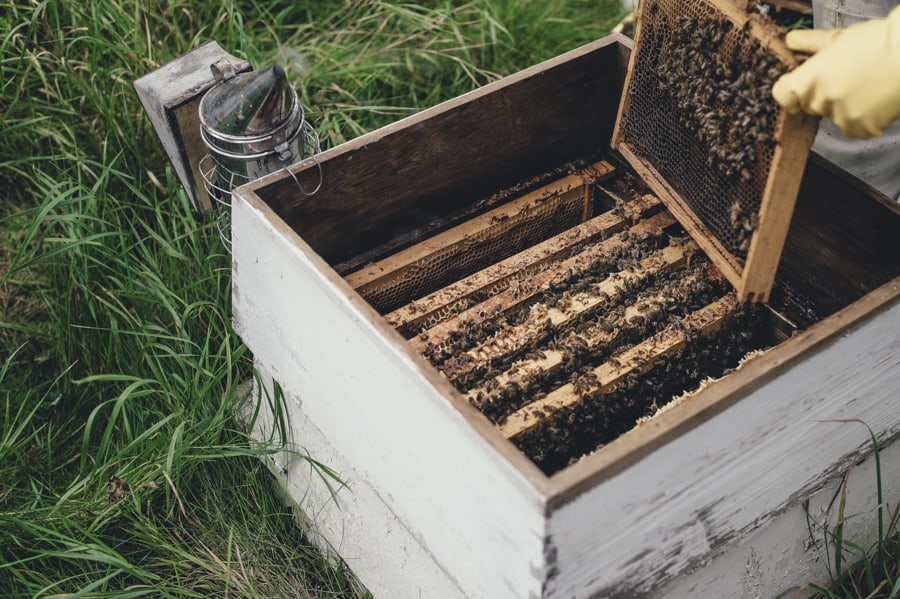
Is beekeeping ethical? Commercial versus local (backyard) practices
Now that we’re a little more versed in how honey is made and harvested, let’s discuss commercial and local beekeeping practices related to veganism.
The devastating impact of commercial beekeeping
In the current state of the honey industry, the supply can simply not meet the demand. Again, we’re talking about a 9 billion dollar industry that continues to snowball.
How is it that the population of bees globally is drastically decreasing (due to chemical sprays that are killing them), yet we seem to be ramping up the production year on year as the popularity of honey increases?
If you’re buying commercially produced honey, sorry, I have some bad news for you—likely, you’re not buying pure honey.
After watching the documentary series Rotten on Netflix, where they did an episode on bees, it all leads to one answer. Adulterated honey.
Adulterated honey is honey that has been tampered with. Typically a mix of imported kinds of honey to round out the flavour and ingredients that shouldn’t be in honey.
For many years, producers manipulated honey to look like it was just pure honey when it was lab-tested.
Ingredients like rice syrup were used that weren’t able to be detected in the lab tests. Some also found medications and blends of rice malt and fructose corn syrup in the test results.
The honey blend was also detected to have antibiotics which could be illegal and deadly. It’s no joke.
Without going into too much detail, let’s briefly break this down.
In commercial beekeeping, naturally extracted honey doesn’t make them much money. It’s the contracts with the farms that need bees to pollinate their crops that make up significant revenue.
Pollination is dependent on two different factors; insects or the wind. We wouldn’t have many foods if it weren’t for the work that bees do.
For bees to pollinate these crops, typically monocrops—they have to be transported year-round to pollinate them. This would be very stressful for the bees, and many die in the transportation process.
It’s unnatural for hives to be moving around from place to place, which also increases their chances of disease.
The reason many bees die in this type of beekeeping is that the sprays that are used on the crops are deadly. Billions of bees are dying worldwide because of chemical use.
It’s also been found that bees can get lost and disoriented after being in contact with the chemicals, and if they don’t return to their hive within 24 hours, they die.
Death comes because pesticides weaken their immune systems, create issues with their digestive systems, slowly harming their brains.
If you’re interested in learning more, you can read up on CCD (Colony Collapse Disorder), which has become an issue globally since its first reporting back in 2006.
When honeybees come to monocrops for pollination, they end up pushing out all other wild/native bees and other insects in that area.
This means that there’s less food for wild bees to eat. This would explain why certain breeds of bees are dying globally as the honeybees would push out other species. This can easily disrupt the normal flow of local ecosystems. We’ll be discussing this point in greater detail later.
With commercial beekeeping, bees are subject to various processes and procedures, including artificial insemination for the queen and clipping of her wings, so she doesn’t fly off, manual replacement of the hive’s queen bee, treatment with antibiotics, and culling.
Culling is done for many reasons; one is when there’s an outbreak of disease, and another is if it’s the end of the pollinating season.
Producers kill the colony to save costs over the winter months as it’s cheaper to start with a new batch of bees when the season begins again rather than to look after their existing colony.
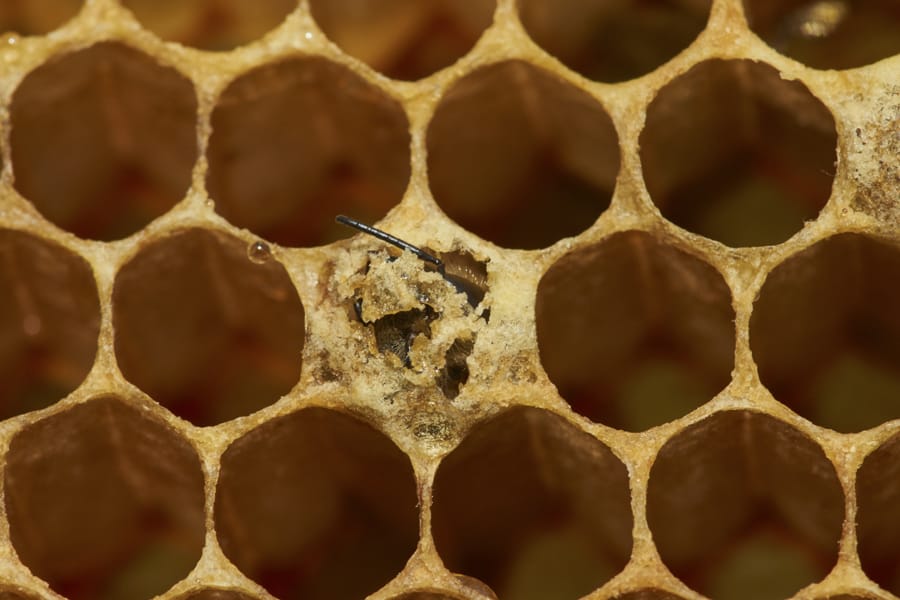
How does local beekeeping compare?
In an attempt to remain objective in this article, we’ve tried to put ourselves in the shoes of a local beekeeper.
This meant reading books like Backyard Bees: A Guide for the Beginner Beekeeper by Doug Purdie, in addition to hanging out in online beekeeping communities.
During our research, it became clear that local beekeepers are passionate, knowledgeable and care about their bees. There’s almost a pet-like relationship between keepers and their hives.
Unlike commercial processes, local beekeepers don’t use any harmful chemicals, artificial sweeteners or antibiotics.
Outside of acquiring a new hive either from a wild swarm, a new bee package, or second-hand, bees are rarely transported.
While not as drastic as commercial beekeeping, some variables may harm or even kill bees, even as a local beekeeper.
The first variable is integrating a hive into a new environment. Whether the keeper is getting a swarm, combining hives, new, second hand, there’s always a chance for injuries and death in this process—especially with new beekeepers.
Beekeepers may need to introduce a new queen to the hive or replace their queen bee every year to keep a healthy population in the hive. This process is intricate, and if the colony rejects the new queen, the rest of the colony will kill her.
The third variable is the extraction of honey. While most local keepers will tell you they do this without harming any bees, it doesn’t mean every local beekeeper is consistently patient and caring when removing bees from the frames.
Whether bees are blown, brushed, shook—if done carelessly, bees will get hurt or killed.
Lastly, like commercial beekeeping, local beekeepers are not immune to disease, which can sometimes result in killing off the sick.
Many of the decisions backyard beekeepers make, even if it leads to bees’ death, is about preserving and growing the colony. So when comparing commercial and local practices, it’s night and day.
If you’re going to consume honey, please consider supporting local producers. Even though these backyard practices are positive, does it mean they’re vegan-friendly? More on that next.
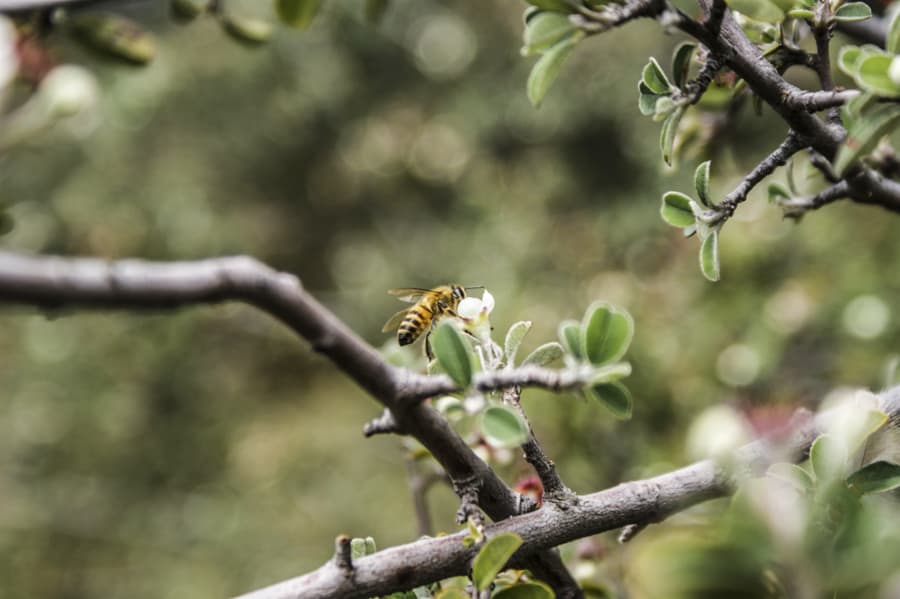
Why is honey not vegan?
From a commercial standpoint, it’s clear that bees are exploited and mistreated for profit.
Much like the industrialised farming of cows, chickens, sheep, pigs, and fish, commercial beekeeping is not a concern for the bees’ wellbeing, and most folks would agree that mass-scale honey is not vegan.
However, when it comes to local beekeeping, the answer becomes a little more complicated.
Natural beekeepers will argue that:
- Bees are a powerhouse pollinator helping plants and local ecosystems around the world.
- Bees are critical for crop production. When bees pollinate, they increase yields by as much as 60%.
- Native bees, like the Tetragonula in Australia, have a minimal foraging range of up to 800 metres (875 yards), compared to 3.2 kilometres (2 miles) from the honeybee, and don’t provide nearly enough honey for humans to consume.
- Pure quality honey has many health benefits, including antioxidant effects, antifungal properties, the ability to heal wounds, soothe sore throats, and improve digestion.
There’s no denying that there are benefits to producing honey; however, it’s an entirely different story regarding veganism.
The worker bees are the heavy lifters of the colony. They do everything from cleaning, feeding, guard duty, collecting water and foraging for nectar.
These females work to a point where they can’t fly anymore. Many died outside the hive, unable to fly home as their wings were so damaged.
From birth to death, the lifespan of a worker bee is four to five weeks, and during that time, they make roughly a quarter teaspoon of honey.
Imagine this. You work hard all your life, doing 70-80 hour weeks and make very little money. You can’t afford to do anything else but work; you’re just trying to survive.
Now, think about someone else coming along and without permission or necessity and taking or “draining” your money—and there’s nothing you can do. How would that make you feel?
Would you consider this fair? Or would you feel exploited, enslaved even?
If we simplify it in this way and start considering that bees weren’t put on this earth to provide honey for us, we can begin to shift how we see them. They gather honey for their families.
We always want to be pushing boundaries to include more animal products in our diet. Backyard eggs and honey being the ones that are most “justified” as entirely natural and okay.
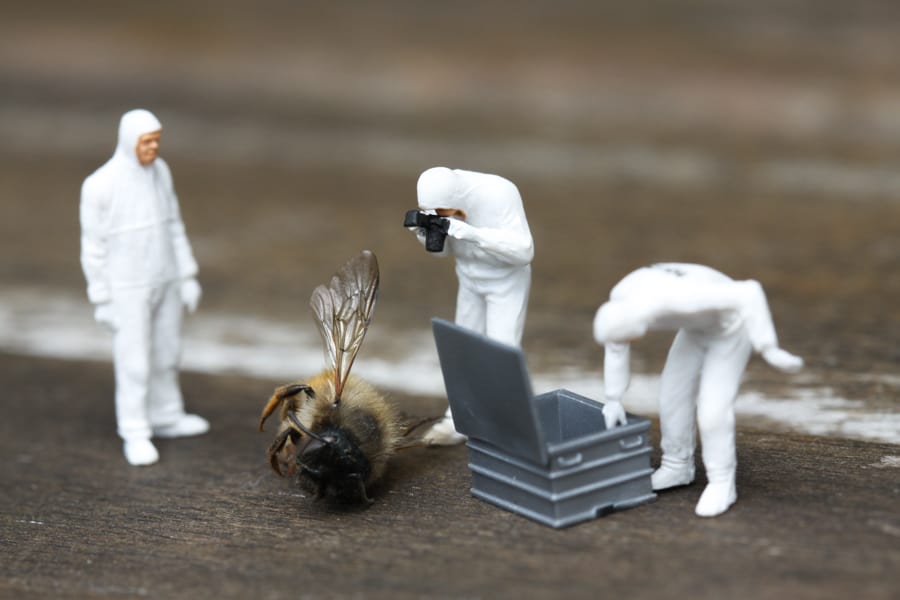
Honeybees versus native bees: the real problem
For years we’ve heard there’s a bee problem. If bees go extinct, then we’re all doomed! When you see that 75% of crops are dependent on animal pollinators, you start to understand the urgency.
However, the issue with this stance is the propaganda that our pollination problem is linked solely to the survival of honeybees.
Here’s the deal. After the global beehive collapse in 2008, the honeybee population has successfully bounced back.
What’s scary is that honeybees are creating an imbalance in our ecosystem. Yes, you read that correctly. Honeybees could be doing more harm than good.
As it currently stands, here’s the division of production across pollinators:
- 39% honeybees.
- 38% other bees.
- 23% non-bees, including bats, butterflies, hummingbirds and flies.
As you can see, as one species, the honeybee does the bulk of pollinating due to our ability to farm them. Yet, they’re not always the best at the job.
Native bees, for example, perform 90% of watermelon pollination. They also return twice as many blueberries compared to honeybees.
Heck, honeybees are not even big enough to successfully pollinate tomatoes. We need a big furry bumblebee to get the job done. Meanwhile, 96% of the bumblebee population has died off.
The honeybee species is pushing out the other 19,999 species of native bees and other pollinators, spreading disease and destroying biodiversity along the way.
Before Europeans imported honeybees across borders, we lived for centuries without needing honeybees.
So what’s the deal here? Why so much talk about saving honeybees and silence towards the native species?
I was embarrassed that I couldn’t tell you what a native bee looked like my whole life growing up in Australia.
Here’s a hint, they’re not yellow and black. The colours and sizes of different bee species are endless. Just type in “native bees in {insert your country}” and check out the images. You’ll be blown away!

These native bees are mostly solitary, don’t sting and live in dirt, sand and wood.
Here’s the punchline, only one bee species produces honey. By singularly supporting 0.005% of the bee population and ignoring the rest shows that humans expect a return on their “altruistic” efforts.
Honeybees dominate the narrative because they provide honey. That’s why some researchers think of honeybees as livestock, not wildlife.
Even the honest backyard beekeeper is helping grow the monopoly honeybees have on plants to pollinate in their area.
Is there such a thing as vegan beekeeping?
In 2012, Will Curley made waves on the internet by saying that he’s a proud ethical beekeeper while maintaining vegan values.
As you can expect, his story garnered a polarised response—mainly amongst beekeepers and hardcore vegans.
“Vegan” beekeeping or well-practised local beekeeping is based on the concept of only taking honey from the hive in Spring. This is after the bees have already eaten what they need for the winter.
It’s thought that the honey during this particular window of time is considered excess that can be quickly replaced and does no real harm to the bees.
The question is, how’s the excess amount of honey determined? Who says they have excess, and what is enough for them? How would we know where to draw the line?
Measuring excess animal “byproducts” is an ongoing ethical debate. For instance, what’s considered surplus eggs from hens? Or when have calves drunk enough milk from the mother cow?
It’s safe to assume that most small scale and backyard beekeepers leave some honey for their bees. However, when one colony can eat up to 50 kilos (around 110 pounds) of honey in one year, I don’t know if the excess is justified for it to be taken.
Unfortunately, humans can’t communicate with bees, and thus there’s no permission to take their resources. If we don’t have consent, isn’t it safer to not intervene instead of assuming it’s okay?
The bottom line is that we don’t need it. Humans can comfortably survive and thrive without consuming honey, and we can help bees at the same time. We can live in harmony with them and help them in more than one way.
We can plant more bee-friendly plants in our gardens and create bee sanctuaries that help the bees live out their lives without taking their honey.
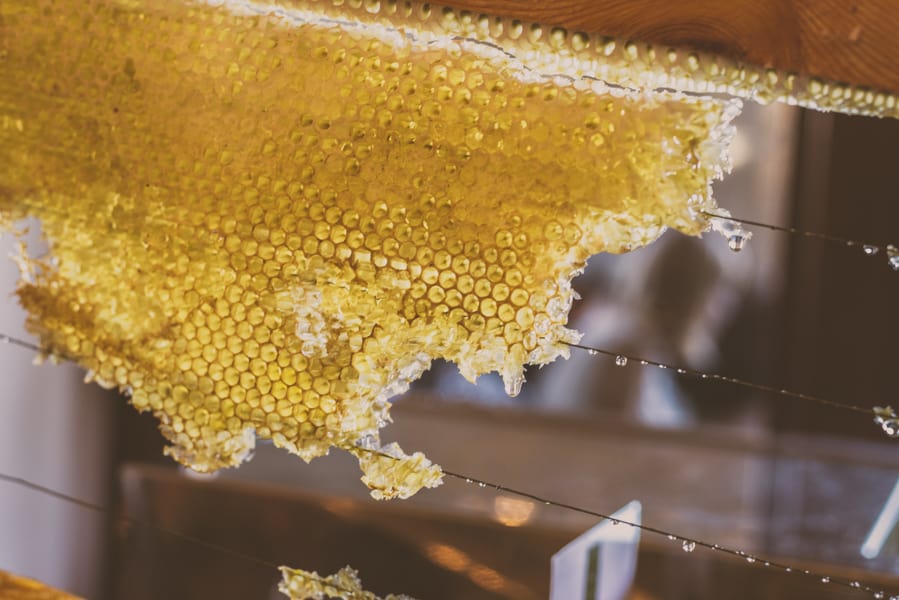
Is avoiding honey as vegan dogmatic and over-the-top?
For many, honey is where we draw the line when it comes to how far veganism goes. We’ve seen vegans get called unrealistic because they choose not to consume honey.
Most vegan books that cover the topic of honey are met with reviews like this (click/tap to expand the image):

As honey’s ethics is highly debatable, it’s understandable why even some vegans think this approach is too strict or regimented.
At the same time, we also see the perspective of those labelled as the vegan police who present similar arguments to what we’ve covered already.
We think it’s essential to be clear about honey production and veganism for its cultural impact. As discussed in our piece about extending the definition of veganism and our podcast about the grey areas of veganism, consuming honey as a vegan can be incredibly confusing.
People who aren’t vegan observe that some vegans avoid the honey ingredient in everything they consume, while others are happy to roll with it. They’re left thinking, “so is honey vegan-friendly or not?”
The animal rights movement, which already has a lot to fight for and prove, risks losing credibility over simple terminology. Veganism as a concept and a practice loses some power. The power needed to help reduce the unnecessary exploitation and harm to animals. Period.
So no matter where you position yourself on the spectrum of veganism and honey, we encourage you to think about how you use terminology when communicating with others.
For example, if you consider yourself vegan but choose to consume honey, maybe take the time to explain that you’re more plant-based or why vegans choose not to eat honey.
These seemingly minor interactions add up over time and affect our culture and ability to be successful activists.
We wish the nuanced terminologies we use weren’t a big deal, but unfortunately, the details matter when trying to be clear and convicted in a cause.

Should vegans stop eating foods that are pollinated by bees?
This is a tricky question to answer. We farm differently and at a much larger scale than what we did even 50 years ago.
Huge monocultures have created a higher risk of disease in bees and exposure to pesticides sprayed on the crops—causing many issues, as mentioned before.
Read more: Can Vegans Eat Avocados Pollinated By Migratory Bees?
You can learn more about this in a documentary called Vanishing of the Bees.
Bees are pollinators not for us to benefit from, but it’s something that happens when they collect for themselves. The pollination occurs by multiple types of bees, not just honeybees.
This process is essential for us to have many of the foods we find in our stores and markets and backyards today.
We shouldn’t focus our attention on stopping the consumption of foods pollinated by bees—as this happens naturally. Instead, we should focus our attention on bringing back different bees, preventing honey and their wax consumption, and creating sanctuaries for bees to help them live out their lives.
We would have to do this like we would for any other animal that has been brought into existence for our selfish benefit and crowded out diversity in our ecosystem.
What’s a vegan-friendly approach to helping bees and other pollinators?
We’ve already touched on some ideas to help with the pollination issue, but here’s a summarised actionable list of cruelty-free things we can all do to help our ecosystem.
1. Support local farmers
Support local farmers that grow a variety of organic fruits, nuts, seeds and vegetables, rather than buying products that depend solely on the exploitation of bees and other animals through monocrops.
2. Plant a bee and pollinator-friendly garden
Whether you have a full-blown garden or just have the time or space for a few pot plants, providing a variety of plants will go a long way to helping our planet’s busiest pollinators.
The benefits of nurturing plants are genuinely remarkable. Some examples include:
- Growing your food.
- Having a beautiful garden.
- Providing options for pollinators that helps your local ecosystem.
- Gardening is known to have therapeutic qualities.
If you can, try to plant natives to see if you can encourage local pollinators. Alternatively, if you want to target honeybees, check out this guide on the best plants for bees.
It’s worth noting that bees like sunny areas, so try to focus your plants in those areas of your yard to give them a source.
3. Avoid using harmful chemicals like herbicides or pesticides
As we touched on earlier, herbicides and pesticides can be detrimental (sometimes lethal) to all insects. Many of these chemicals leave toxic residue for days, even weeks after use by the bees.
If you want some inspiration, check out these natural alternatives to herbicides to help you manage your garden and help bees.
4. Supply homes and water for native bees
Think of all the skills we’ve acquired over 9,000 years of beekeeping. Let’s put those experiences and passions for use in providing more homes for honeybees and natives alike.
The difference here is that we’re not taking any honey from the bees. It’s truly a selfless act, just like it is to plant a tree.

The ideal way to help bees native to your area is to create a bee hotel, as pictured above. You create a space for them to come and create. Some bees don’t make honey, so make sure not to bring honeybees to a nest like this.
This is the best way to help support bees and our ecosystem of diverse species of bees, so we don’t add yet another to the extinct list. Here is a video on making a bee hotel at home, or you can buy one.
Don’t forget that bees need water. So ponds, fountains and other freshwater sources go a long way for bee health, especially in the warmer months.
5. Help bees by going vegan
By going vegan, you’re helping reduce the impact of monoculture by a long shot.
Knowing that just in the US alone, 41 million tonnes of plant protein is grown for the animal agriculture industry simply doesn’t add up! It’s just an inefficient way of using resources.
This is one of the main reasons the Amazon rainforest is being cleared—to grow feed for livestock and raise livestock.
By avoiding animal products, including honey, you help slow down the demand growing at 8.2% annually.
What are the vegan alternatives to honey?
Many people struggle to give up honey because they love the taste of this thick sugary golden syrup.
Luckily, vegans don’t need to feel like they’re missing out on the honey experience with so many alternatives out there.
You can try the likes of rice malt syrup, coconut nectar, bee-free honey, maple syrup, molasses, and date syrup.
If you love honey-based dipping sauces and dressings? Check out this super simple 4-ingredient vegan honey mustard recipe.
FAQs about the relationship between honey and veganism
Below are answers to some common questions about the ethics of honey. As we continue to update this post, we’ll add more questions to grow the resource.
Is honey tested on animals?
Medical researchers have been known to test honey on various animals, often leading to the death of rabbits, mice, sheep, goats, horses, and even cats and dogs.
Animal testing is another indication that honey isn’t vegan.
For more information, check out these not-so-talked-about findings by KD Angle-Tragner, If You Eat Honey, Read This. As she presents in her article, aloe vera has proven to be an effective cruelty-free alternative to honey when treating pain in patients.
Is organic, natural, raw honey vegan and cruelty-free?
There’s a lot of misinformation about the ethics of labels like organic, natural, raw and pure honey.
If you had to pick one, certified organic means that producers must meet strict processes for making honey. Depending on the region, some examples of requirements include:
– Wing clipping is prohibited.
– Hive locations cannot be within a certain radius of potential pollution sources like conventional farms, landfills, urban centres and contaminated water.
– Hive hygiene must be held to a high sanitary standard.
– Toxic preservatives shall not be used.
Certified organic is always a better option; however, as we mentioned previously, even what is considered to be a vegan beekeeper is still not cruelty-free. Taking bees food and resources without consent or permission is stealing.
Is honey plant-based?
While technically, honey is made by an animal, not a plant, it appears that it’s culturally acceptable and expected that those on a plant-based diet see no problem with consuming honey.

So, is honey vegan?
We hope that this guide has shed some light on why honey is not vegan. With so many alternatives out there and actionable cruelty-free ways to help pollinate plants, we don’t have any reason to consume honey.
Now it’s over to you, what do you think? Do you think honey is vegan? We would love to hear your thoughts in the comments below.

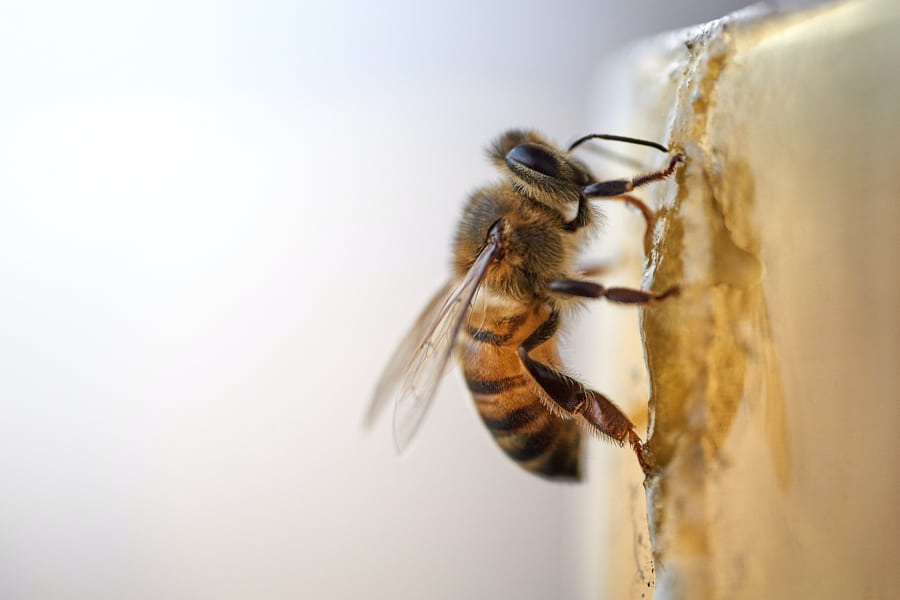
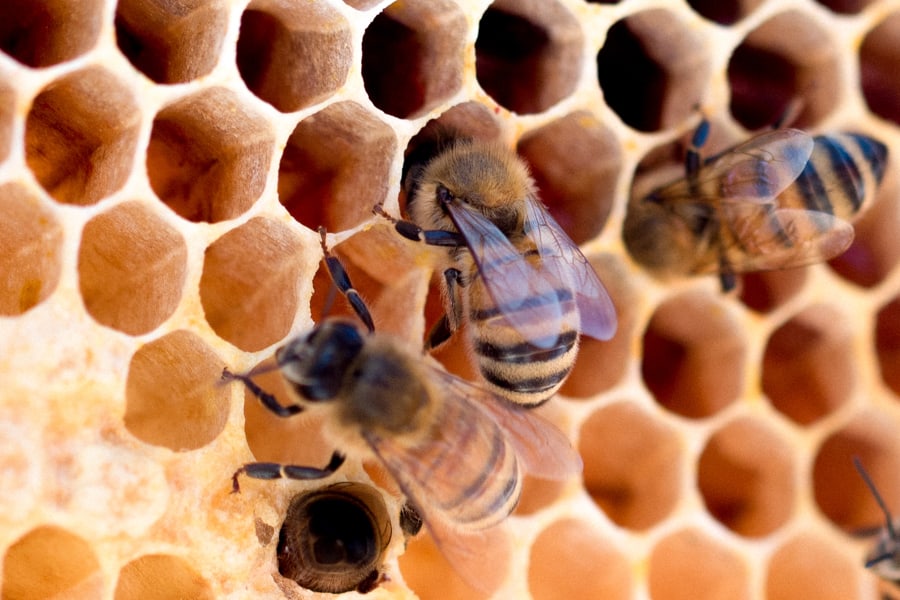
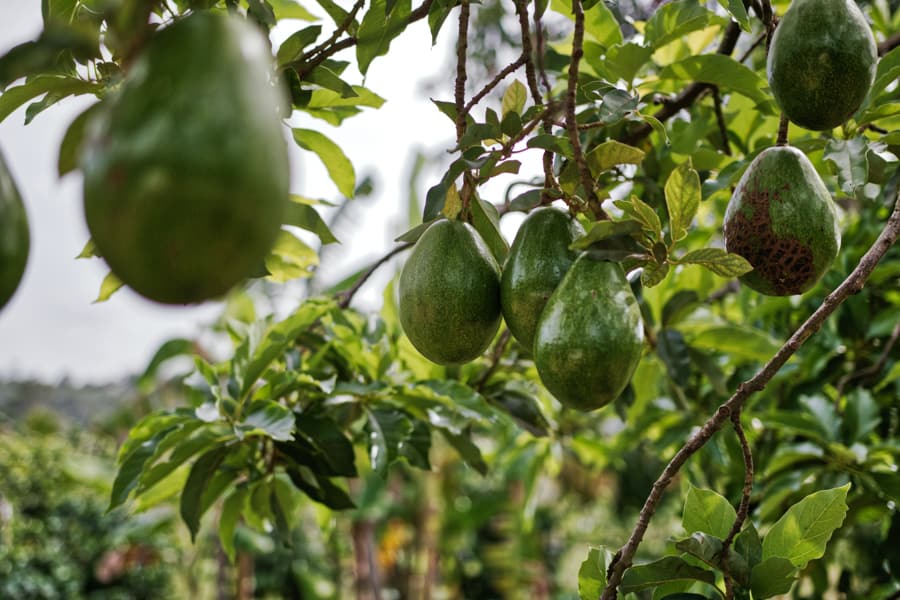
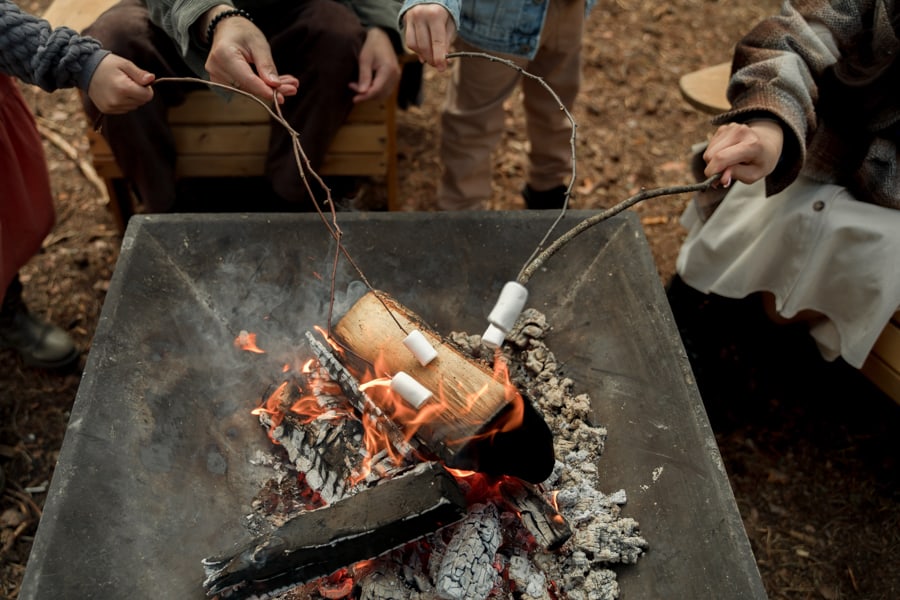
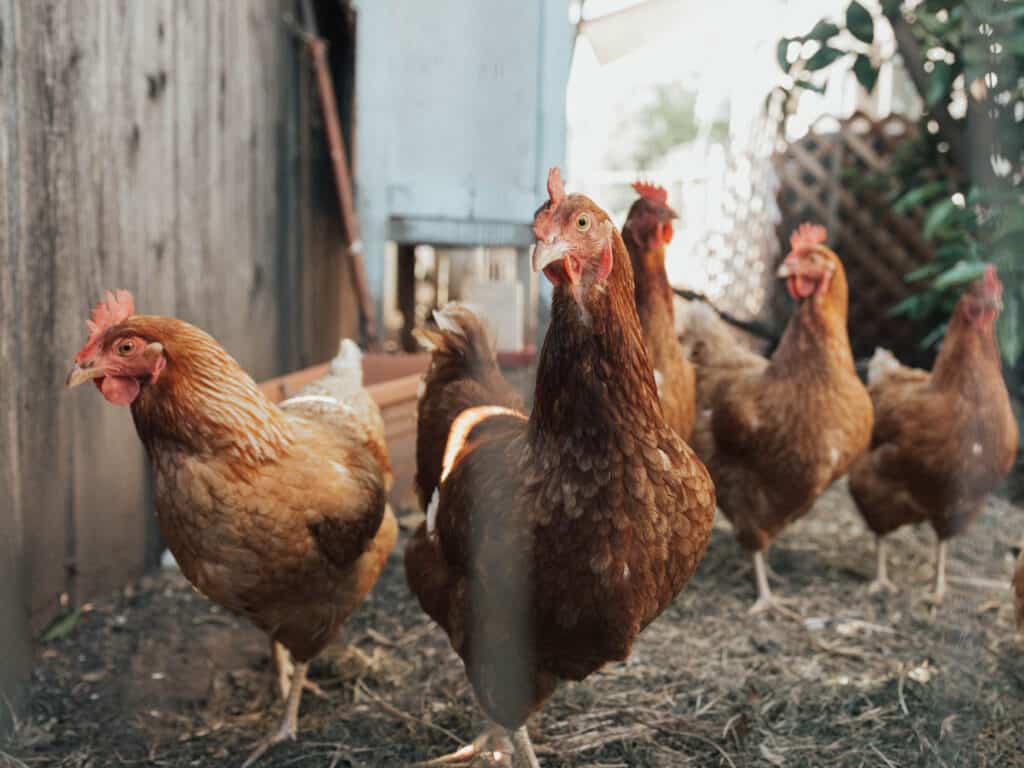
Wow!! Eye opening. I never knew. I have been on the fence with honey and eggs since going plant based… this definitely changes my perspective on honey. I don’t want anything to do with it. Not even for the health benefits. Please leave the honey for the bees!!
There are more than one kind of bee that produce honey, in my country, (sweden) we have two. The normal honeybee is the most common but we also have “nordbiet” “the northbee ” that is endangered, and there is an organisation to help preserve it.. secondly, I believe that bees are intelligent and that non verbal communication is possible, and hence some sort of ” concent” can be accieved. The beekeeper provides the hive, aswell as water and flowers and in return take some of the honey. If the bees dont like it, they can move… (wich sometimes happens). I am not vegan, but I would not critiqe anyone that called honey ” vegan” since I dont think bees are explioted under these circomstances. / Liv
I don’t think there’s anything wrong with being vegan and eating honey. I know some people might disagree with me, but that’s okay. I respect their opinions. I just don’t think honey is an animal product. I think honey is a great source of energy and it’s very tasty. I’m not saying that everyone should start eating honey, but I don’t think there’s anything wrong with it if you are already. I just research where I get my honey, so I’m confident that the bees are well cared for. This has been my favorite for a while now https://www.amazon.co.uk/Pure-Gold-Premium-Select-Manuka/dp/B07VBB34YW?ref_=ast_sto_dp&th=1&psc=1 and again I just wanted to share my thoughts on this subject.
To tell the truth, I am so glad that I came across your article because it was the best opportunity to expand my knowledge about bees and different subtleties connected with them. I can say that before this moment I had an absolutely different idea about a lot of things and you blew my mind by some facts. After reading your article, I came to the conclusion that bees are huge workers and we can’t even imagine what efforts they need to make in order to make honey, but people really often simply underestimate it. It is so sad that bees are exploited and mistreated for profit because they perform such a significant function in our world and we need to keep them safe. Unfortunately, now it is difficult to deny that honey is not vegan because there were given so many arguments and indications in your article. Of course, it is important to take all necessary measures in order to change the current situation and provide bees with support. I think that only through joint efforts can we achieve results.
I was blown away by your article. I learned so much about bees and the complexity of the honey-making process and how hard bees have to work to make it. I was just as impressed by your in-depth analysis of the ethical/moral issues. They were presented in a fair, non-biased and empirical way. I have been vegan for 22 years and stopped eating honey about 10 years ago. I gave up honey because of the general principle of respecting other species and not making the assumption that I have the right to take something belonging to them; but now thanks to your article I know so much more about why this was the correct way to go. I will share your article with my son who is a champion of bees’ rights. Thank you so much for this article; I wish I had your ability to present my thoughts in such a clear and academic manner!
Hi Carol, I’m glad you enjoyed the read.
22 years vegan is impressive! Reading how well you articulate your words, I’m sure you could present an objective argument 🙂
Good luck with your son. Either way, his heart is in the right place.
Thanks for an informative and well-researched article. It’s interesting how much pushback this topic gets. Mine isn’t the busiest blog at all and yet my honey post has received plenty of comments (mostly against).
I’m going to link to your article as mine isn’t nearly as in-depth. I basically said it’s stealing. Lol. 🙂
Hi Angela, thanks for linking and for taking the time to comment.
And you’re right. The ethics of beekeeping pushes people’s buttons.
I’d love to hear how you go with the urban beekeeper on the property you’re staying at.
Not all beekeepers are unethical. It is extreme to expect all beekeepers to mistreat their bees. If you expect all beekeepers to be the worst beekeepers, then extreme Veganism is an extremist religion and is no different to ISIS.
Honey is definitely vegan if ethics are adhered to. Do not sugar feed. Do not almond pollinate (Almonds are 100% not vegan). Do not wing clip. Do not extract more than excess honey. Do not extract over winter. Remove Pests and Diseases. Provide a safe and clean environment for the honeybees to live. It is far better on the environment if honeybees (not native) are not allowed into the wild to dominate and starve native bees.
Source honey from a ethical beekeeper to ensure the honey is vegan friendly. Honey can be vegan, but you must make the effort to ensure the beekeeper is using ethical practices.
Also, some incorrect information on this article: Bees only protect their brood (larvae). They will abandon honey if the hive is full. If there is no brood, they won’t kill themselves to protect it. Genetic selection isn’t to increase honey production but to decrease aggressive behaviours. Ironically, aggressive bees produce far more honey than gentle bees.
Hi Mark, I hope after reading the other comments on this post you can attest that our stance is not black and white on the ethics of beekeeping. Like wool, silk and other ethical concerns, there’s an inherent sliding scale of ethics depending on the supplier of these goods. So like wool production, you can find examples of ethically made honey; however, the majority of honey supplied uses unethical practices.
Even so-called “ethical” beekeepers are not entirely ethical, in terms of ticking the boxes you mentioned. The challenge for consumers is finding suppliers that they know for sure have ethical practices. Our position is, if it’s indeed challenging to find the good from the bad in a very grey area, there are alternatives. In any case, we appreciate your experience and perspective with us.
“then extreme Veganism is an extremist religion and is no different to ISIS”
I’m sorry, what? Do you even understand the words you used in this sentence, especially “veganism”, “religion” and “ISIS”?
Veganism is not a religion, and ISIS is not a religion either. You might want to stick to bee facts and not blurt out incredibly stupid sentences like this one. Wow.
Great read! I learned a lot. I do have to add that many vegans, including myself, don’t avoid the exploitation of ANIMALS but of SENTIENT beings. This distinction is important because if having animal status makes a being worthy of respect, why not extend this to plants? What sets different living things apart is their sentience and capacity for suffering. The sentience of insects is contested. While we can observe their reactions, we cannot be sure if they are really suffering or not. This is my main issue with the vegan honey debate. I would love to see more people discuss it and hear others’ thoughts!
If exploitation of bees is a vegan issue how do you justify eating plants the bees polinate all edible plants and by growing your own veg or buying plants from non natural suppliers you are exploiting the bees anyway 🤣
Organic symbiosis and exploitation are two very different things… what you described would be the former as opposed to the use of constraint
Did you read the entire article? Bees are not the only insect that pollinate our food. They are regarded as the most important and worthy of mentioning because humans also use bees/beekeeping to profit from their honey. Other insects (and even hummingbirds) also pollinate food.
Honey is not a vegan product in the least. Vegan means of non animal origin or derivative. And we know for a fact that bees make honey for themselves and their larvae, not for humans to consume. Saying that honey is vegan is like saying that cow’s milk is vegan, whereas like with honey, cow’s make it for their young. How is all this hard to understand?
I just love this piece too about bees. Bees are very intelligent and know me from others because I have fed them. They literally know my vehicle when I pull in fly through the window to be fed. What’s happening to them everyone needs to know. I just looked up Paul S again as he has found a way to help them.
https://fungi.com/pages/bees
The marriage between Monsanto and bayer is one of the worst things to happen to our earth and her inhabitants.
Hi, Brenda 🙂 Fantastic share! What an interesting concept. I look forward to digging into the page.
Such an informative article. As I read I kept comparing it to the popular narrative that “bees are dying and we don’t know why” when in reality there are many reasons many of which can be attributed to the callous and dangerous practices of commercial agriculture. Having kept bees as a hobby in the past- I did extensive research on whether to keep the honey or not. And I think ultimately you have to be responsible and do what’s best for your hive. If your hive is flourishing and you don’t live somewhere with harsh winters it may be okay to collect honey. I don’t think that backyard bee keepers collecting honey is having any profound impact on the current state of bees and if anything is beneficial to the species and the surrounding ecosystems.
Thank you for sharing Ella. I agree you have to do what’s best for your hive and the bees. But I do worry about the fact that collecting the honey still enters you into a relationship with the bees where they are being taken advantage of for our gain. It’s more of a mindset thing.
I also agree that backyard beekeeping doesn’t have a profound impact on the overall industry of beekeeping, yet. My concern there is that the types of bees that are kept and how those bees come to the backyard beekeeper. If they are rescued from commercial beekeepers or have a local species that help the ecosystem, that’s fine. But if they are bred (the bees that are not normally found in that area) and artificially inseminated queen bees for the purposed of “keeping bees”, then I don’t think it’s a healthy practice for more people to get into.
It’s the same idea as the backyard chickens. Where did the chickens come from? Someone that is benefiting from selling them or are they being rescued from cage farms or are chickens that would have been slaughtered otherwise (e.g. male chicks). Something to consider.
Hi, I’m not agree. The honey is very helpful for human health and one of the best food. Of course if it’s made ethical.
Thanks for your comment Verginia.
I do agree that it has many health benefits, but if we can use other alternatives that don’t exploit bees, then why not use them? I understand that there can be more “ethical’ ways to make honey, but in the end, they are still used for our own personal gain. Not for theirs. Bees make honey for themselves, not for us.
Bees make honey for themselves and their larvae, not for humans to steal and consume. It’s as simple as that. Honey is not for human use. Bees make it for themselves and need it for their survival. Humans do not require honey for survival.
Thanks for the post Masa. Unfortunately what you have said about large scale beekeeping operations and mass produced honey is correct.
However, I should mention feeding sugar water sometimes is necessary as an emergency feed to keep the hive alive if they were not able to produce enough honey. This can happen if the spring was too wet or if there is a sudden cold snap.
I also feel I should mention the spread of the varroa mite has put a huge stress on bee populations. The viruses spread by varroa mites and pesticides are likely responsible for CCD. Ironically, the largest hives have the most mites and bigger hives are more profitable to commercial beekeepers. So these large scale operations are partially responsible for the continued spread of the varroa mite. Unfortunately the only response they have is to treat with stronger miticides, which cause the mites to become resistant in a few generations. Commercial beekeeping is even more damaging and exploitative than what you mentioned here, unfortunately.
I still believe backyard beekeeping can be done ethically because as a hobby there is no profit motive. If you feel uncomfortable taking honey, you dont have to. You can just let them pollinate your neighborhood. Top bar hives or ‘bee gums’ are ideal because they resemble a hollowed log which is where bees would make their hive in the wild. I’m just speaking from my own experiences with beekeeping. I hope this was informative.
Thanks for sharing Dominic.
I knew about the feeding of sugar water to bees in times of need but forgot to mention it in the post, so thank you for adding that in. We have left out sugar water in our backyard in the middle of the summer for them to hydrate and feed at the same time as when you live in a rented property; you don’t have bee-friendly plants around to help them.
In my research, I did come across the mites but didn’t think it was a relevant topic to bring up, but it is a sad fact. Some interesting facts there, sounds like a vicious cycle that the commercial beekeeping industry has themselves in!
I also believe it can be done ethically if they are left to their own devices. Even if they aren’t being exploited for the profit, they would be for what they make – it still enters into a relationship that makes us benefit from their hard work. Honey is an amazing thing, but I still believe it’s not designed for us, but the bees.
I’ll have to do a bit more research into the type of hive you mentioned, sounds like a great solution to have if you want to create a proper bee sanctuary in your own space.
Thanks again for sharing, as always 🙂
Thank you for an informative article! I think the mites are actually very relevant, because their spread to North America and Europe is one of the reasons why the honeybee is highly unlikely to survive in any significant numbers without human intervention. If left to their own devices, without miticides and treatment, a colony would quite quickly become overrun with mites and collapse as a result of the diseases they spread.
The problem is that Apis melliflera, or the western/European honeybee, is not adapted to dealing with the varroa mite at all. The mites were spread from an Asian species of honeybee (Apis cerana), which has evolved various methods of dealing with the mites. Interestingly, a lot of these adaptations make them unsuitable for commercial honey production…
It might be that over time Apis melliflera would develop similar resistance, but evolution is a very slow process indeed.
Also, on the honeybee hotels I would strongly recommend that people line the drilled holes with some sort of removable paper or otherwise clean them on a yearly basis. Without this, these solitary bee homes can also become overrun with mites, and kill the developing larvae before they ever get a chance to emerge. Also, these holes must be at least 6″ long/deep – many species of bee will only lay female eggs if the holes is deep enough, and otherwise will fill the hole with male bee eggs.
Hi Paulina, thanks for sharing this with us. We didn’t know about the massive impact of mites on bees. Interesting stuff.
Wow! I read a lot about bees but I did not know about the depth effecting whether the larvae will be male or female. Thanks for sharing your knowledge.
“We shouldn’t focus our attention on stopping the consumption of foods pollinated by bees—as this happens naturally.”
As you point out, many crops have far, far lower productivity without the use of commercial contract bee pollination. Many effectively rely virtually entirely on honey bee pollination to be at all commercially feasible. If you want the same amount of almonds, apricots, zucchinis, kiwi fruit, avocados (the list goes on – and on), without those honey bees being involved, just how much more land do you say would need to be cleared for cultivation at the lower efficiency (and so how much more habitat needs to disappear)? It’s simple arithmetic. Or I guess we can just do with less food. Next time you eat an almond or avocado, know that you are relying on a contract-provided honey bee for it to have been produced at a price anyone would pay for it, and without clearing even more land to produce it at low efficiency.
Also, if you don’t harvest honey and a hive becomes ‘honey-bound’, the bees will swarm or abscond elsewhere. Possibly into someone’s house. Where they will likely be exterminated. Or you give them more boxes to store honey, where they will store it in good times well past any plausible future need. You make a honey bee working relentlessly until it dies seem a travesty – but this is how they have evolved. They have no ‘off’ switch. They never get to a certain level of stores when there’s lots of nectar and say ‘enough, let’s relax’. Harvesting only in good times and reserving enough for winter without needing sugar syrup is a good backyard beekeeper’s aim. Presuming what we do is, well, presumptuous…